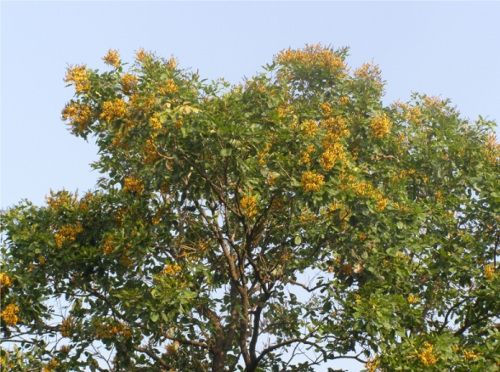Sabinsa Announces Reforestation Project to Ensure Supply of Indian Kino Tree
The company said that this reforestation project will ensure that more than 166,600 Indian Kino trees, whose extract is traditionally used to help maintain healthy blood sugar levels, are planted over the next 10 years.
Photograph by Silviculture South/Wikimedia Commons/CC-BY-SA-4.0

Sabinsa Corp. (East Windsor, NJ) announced that it is funding cultivation of the Indian Kino tree (Pterocarpus marsupium) across 250 acres of the Seoni and Balaghat regions of Madhya Pradesh, India. The company said that this reforestation project, which will ensure that more than 166,600 Indian Kino trees, whose extract is traditionally used to help maintain healthy blood sugar levels, are planted over the next 10 years. It noted that this reforestation effort is “the first attempt to conserve this high-value threatened tree species in India.”
Pterocarpus marsupium extracts from the Indian Kino tree have been used for centuries in the Ayurvedic healing tradition as a method for controlling blood sugar levels. However, as consumer demand for traditional, herbal ingredients like Pterocarpusmarsupium extract continues to grow, there is also a growing risk that industries will deplete the natural sources of these ingredients.
In a press statement from the company, Shaheen Majeed, president, Sabinsa Worldwide, explained why Sabinsa’s initiative comes at the right time: “As our research on Pterocarpusmarsupium extract confirmed traditional usage and we began to anticipate future demand for the extract, we became concerned that demand could quickly decimate available supplies. The cultivation will not only help us have a sustainable supply, but will preserve this traditional plant in India.”
The company has long been committed to notable sustainability efforts, such as its existing contract farming program through which the company seeks to establish fair trade practices with local farmers. Through this program, Sabinsa not only provides the farmers with seeds and teaches them how to farm crops using new technologies and methods, it also guarantees that farmers are paid a set price for a growing season, regardless of the output. Now, the company says that the reforestation project is the logical next step in its sustainability efforts.
The reforestation organization Madhya Pradesh Rajya Van Vikas Nigam Ltd. will perform the cultivation and maintenance of the plants for a minimum of five years, after which time the Kino trees should be self-sustaining. The land will be provided by the forest department of the state of Madhya Pradesh.
Sabinsa currently offers two ingredient extracts obtained from Pterocarpusmarsupium, Silbinol and pTeroSol, both of which the company says support blood sugar management.










